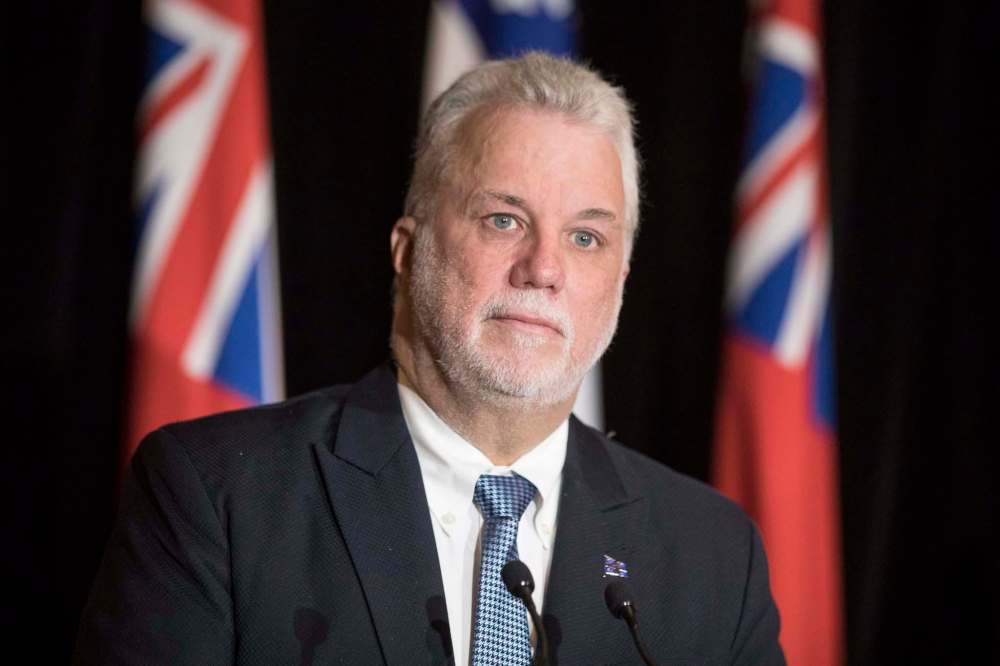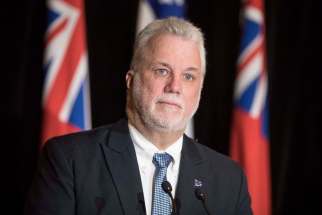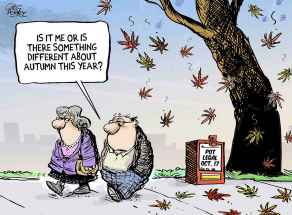Quebec turns back on separatist ideal
Read this article for free:
or
Already have an account? Log in here »
To continue reading, please subscribe:
Monthly Digital Subscription
$0 for the first 4 weeks*
- Enjoy unlimited reading on winnipegfreepress.com
- Read the E-Edition, our digital replica newspaper
- Access News Break, our award-winning app
- Play interactive puzzles
*No charge for 4 weeks then price increases to the regular rate of $19.00 plus GST every four weeks. Offer available to new and qualified returning subscribers only. Cancel any time.
Monthly Digital Subscription
$4.75/week*
- Enjoy unlimited reading on winnipegfreepress.com
- Read the E-Edition, our digital replica newspaper
- Access News Break, our award-winning app
- Play interactive puzzles
*Billed as $19 plus GST every four weeks. Cancel any time.
To continue reading, please subscribe:
Add Free Press access to your Brandon Sun subscription for only an additional
$1 for the first 4 weeks*
*Your next subscription payment will increase by $1.00 and you will be charged $16.99 plus GST for four weeks. After four weeks, your payment will increase to $23.99 plus GST every four weeks.
Read unlimited articles for free today:
or
Already have an account? Log in here »
Hey there, time traveller!
This article was published 09/10/2018 (2623 days ago), so information in it may no longer be current.
Quebec’s Oct. 1 election was a humiliation for the ruling Liberals of Philippe Couillard, driven out of government to form the opposition in the Quebec national assembly, and a still worse defeat for the separatist Parti Québécois, reduced to nine seats in the assembly — too few for official party status — with just 17 per cent of the popular vote.
Quebecers had already rejected independence in one referendum in 1980 and a second in 1995. With this year’s election, the Quebec public more firmly than ever turned its back on the separatist ideal.
The PQ, formed in 1968, took the fringe-party idea of Quebec independence and made it Quebec’s Big Idea and Canada’s existential threat during the party’s half-century career. Now that the idea has been discarded, Canadians are left to wonder: what was that all about?

Separatism started to matter when it was adopted by René Lévesque, the well-liked journalist and broadcaster who pulled various political splinter groups together to form the PQ. It continued to matter when it was advocated by such persuasive salesmen as Jacques Parizeau and Lucien Bouchard. Before that, separatism was a cause espoused by a few bomb-planters in the Front de libération du Québec and isolated dreamers in the Ralliement National and other equally obscure political clubs.
It seemed like an idea that mattered when Quebecers put the PQ in power in 1976 and again in 1994 and 1998. It seemed to matter in 1980 when the first referendum attracted significant support and again in 1995 when the second referendum came close to passing.
But it was always a bad idea. It was a bad idea because it was based on a sense of grievance, even though Quebec independence would not remove most of the grievances. It was a bad idea because it was a blind alley: if Quebec could separate from Canada, then Montreal and other federalist regions could also separate from Quebec and pretty soon there would be nothing much left of independent Quebec. It was a bad idea because the large, bilingual country of Canada could offer its people far more security, opportunity and prosperity than a small, unilingual Quebec ever could.
The wonder is not that separatism has now been discarded. The wonder is that the idea lasted so long.
What kept it going was the persuasive power of the extremely able advocates who sold the separatist idea to the Quebec public. People liked and trusted René Lévesque. Lucien Bouchard was harder to like but he was extremely eloquent and seemed trustworthy. Once the separatist idea was left in the hands of such lesser figures as Bernard Landry, Pauline Marois and Jean-François Lisée, the power ebbed from it and the crowd drifted away.
This is worth keeping in mind as other Big Ideas arise. The idea of making America great again, for example, has no more merit now than it ever had in the past, but it found a persuasive salesman in the person of Donald Trump. Demagogues in all ages have been able to gather huge crowds of followers in support of all manner of quixotic ideas. The conservative-populist social credit movement was one of Canada’s leading examples.
It’s possible that the United States is going to be a xenophobic, nativist country from now on, but it seems more likely that is just the line that the salesman of the moment is pitching. When he moves on, his ideas will fade from view, like Quebec separatism and social credit.
History
Updated on Tuesday, October 9, 2018 7:08 PM CDT: Fixes publication date








